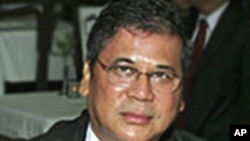Turmoil at the Burmese embassy continued this week when first secretary Soe Aung announced he was seeking political asylum in the United States, becoming the second U.S.-based embassy staffer to defect in less than two weeks.
On July 4, former deputy chief of mission Kyaw Win defected, saying his efforts at political reform had been rejected and that he feared prosecution by the Burmese government.
VOA Burmese service reporter Thar Nyunt Oo spoke with Kyaw Win shortly after his colleague Soe Aung announced his defection on Wednesday.
What do you know about why Soe Aung defected?
Kyaw Win: "As far as I know, he was summoned back to [Burma] within 24 hours. That indicated he's considered guilty of wrongdoing. It also indicates that the Burmese government does not trust the civlian staffer. They trust only the ex-military officials."
|
Listen to VOA's interview in English with Kyaw Win
|
Why 24 hours? What kind of wrongdoing do you think?
Kyaw Win: "I believe that it is related to my defection. But, I've never seen such a practice throughout my career, that someone was summoned back within 24 hours. It is very difficult to gauge why they hastily did that kind of thing."
Can you tell me more about why do you think there's discrimination between the civilian diplomatic staff and the ex-military staff?
Kyaw Win: "Look at the investigations being done for my defection. Why only Soe Aung, who is a civilian staffer? There are so many other people responsible in the Washington office. Everyone is responsible whenever anything happens in the office, so they should be investigated all together.... Also throughout my career, we know that there's unequal treatment to the civilian staff in cases of promotion, transfer, benefits. What I mean is, we don't mind serving as followers after those who are really qualified for their job, but it is not the case in many cases."
What do you hear about other embassy staffers who returned to Burma? We heard that they're being investigated for your defection.
Kyaw Win: "I hope that they will be alright. Think about that: how would they know my defection? How would I tell them?"
But yet they are being investigated.
Kyaw Win: "Yes, they are. But I don't know much details."
Soe Aung was summoned back to Burma. Do you think that this was related to your defection? Can you elaborate?
Kyaw Win: "They [Soe Aung and the two other civilian diplomats under investigation in Burma] are being blamed for not knowing about my defection earlier. But you know that they are my inferiors."
You stated that when you defected last week that the foreign ministry in Burma was disappointed about your attempts to improve relations between the U.S. and Burma. How so?
Kyaw Win: "To improve bilateral relations, we have a lot of give and take and compromise and a lot of negotiation. What I understand about U.S. policy toward Burma is it is very much depends on improving the human rights record and democratic reforms in Burma. But what is the difficulty for me is, as you know, the human rights situation, especially in remote areas, is getting worse. But for me, working throughout my career, I was hoping the situation would improve gradually. But it hasn't. After 1998, [the military leaders] promised changes but they never happened. And in 2004, the government led by General Khin Nyunt was talking about the changes, but it never happened. Things are getting worse."




